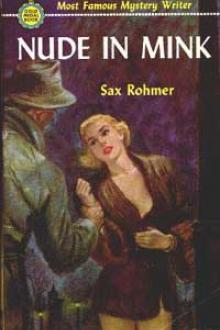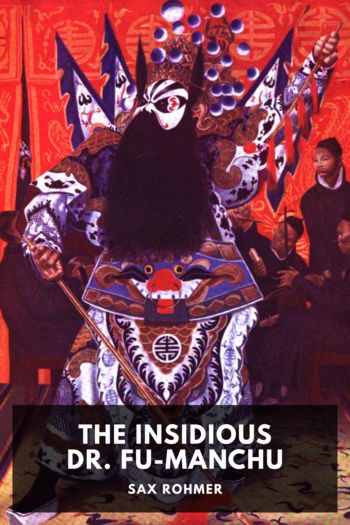Nude in Mink by Sax Rohmer (top reads .TXT) 📕

- Author: Sax Rohmer
- Performer: -
Book online «Nude in Mink by Sax Rohmer (top reads .TXT) 📕». Author Sax Rohmer
“You will instruct him—and then, you will leave.”
Ariosto stood up, and bowed.
“It shall be done. Yet—”
“You have prepared the little Jean?”
“As you instructed me.”
“I will give you the exact time, later. Ian Forrester plays Hamlet tonight. Do you recall the last words spoke in the play by Hamlet, Ariosto?… They are, ‘the rest is silence’.”
She dipped her fingers in the water.
2
Steel Maitland lay back in the armchair, a cheroot protruding at a truculent angle above his black beard. His eyes were half closed. He had been seated so for a long time, silent in thought.
Donovan typed industriously.
Donovan found the task which he had set himself—that of analysing the character and the motives of Sumuru, of endeavouring to account for her presence in London—a palliative. In some degree, it seemed to him, he was aiding in the quest for this inexplicable woman who had stolen Claudette from him.
The light was getting bad, but he typed on and did not interrupt his flow of ideas by crossing to the switch.
One thing about Sumuru seemed to be clear enough. She was not a petty criminal. She did not belong to the increasing gang of crooks who went out for furs and jewels, for loads of merchandise to sell to the Black Market. Her target was a more distant one. In short, Sumuru was an idealist of sorts.
She despised dictators and dictatorships—apparently because they were what she called “ugly.” She condemned war. She believed, according to available evidence, that she had some super-plan to exile war for ever. Her crimes of violence were presumably directed, and directed exclusively, against those who sought to interfere with the development of this super-plan.
Yet what did it all boil down to, unless to a new dictatorship—a dictatorship of women?
Would the world of selected beauty envisaged by Sumuru be a better world to live in than those of Franco? … of Stalin? … of Attlee?
From his own personal point of view, Donovan doubted it.
He did not approve of the types of society favoured by any one of these. But, little as he knew of Sumuru’s ideal state, he could find small ground for awarding it higher marks.
She might promise, as other tyrants had promised, a glorious future to citizens of her dream empire, but, once that empire had been established, would her promises be fulfilled?
Analogies came readily to his mind. They were terrifying, exact. Sumuru’s manner of dealing with obstacles bore a close resemblance to the ways of Herod, of Nero, of Hitler. Her fanaticism must be accepted. Her ideals, also, perhaps were sincere. But he found it hard to reconcile death by rigor Kubus with any scheme of beauty…
Who was this woman?
The police and Secret Service of the world had failed to find out.
Her capital expenditure must be enormous.
What were the sources of her revenue?
“You’ll strain your eyes.”
The warning growl came from Maitland. Rattling of keys ceased.
“Yes.” Donovan sighed. “Getting mighty dark. Let’s light up.”
As he crossed the room, the doorbell rang.
“This will be Ives,” said Maitland.
It was, and a moment later the inspector joined them.
“Any news?” Donovan asked, automatically.
Ives shook his head.
“None on my side.” He stared at Steel Maitland. “Given the job up, Doctor?”
Maitland knocked a short cone of ash from his cheroot.
“It’s given me up. I just don’t know what move to make! The Paris Surete reported this afternoon that no trace can be found of Marcel Duquesne. Their investigations are at a standstill. But I have been thinking hard for the last hour —and do you know what I have been trying to think out?”
“Can’t imagine.”
“I’ll tell you. I have been trying to recapture a memory. I have been struggling desperately to recall where and when I first met Sumuru “
“You have spoken of this several times,” said Donovan. “It puzzles me. Because I can’t imagine anyone ever forgetting her.”
“Nor can I,” Maitland agreed. “But I think I can explain the lapse. It’s one of those cases of misdirection, as the stage magicians call it. I mean that I must have met her under circumstances which left a totally erroneous impression in some way … If only I could place that first meeting!”
“It might help, or it might not,” Ives declared dourly. “For my part, I find the whole thing bewildering, and the longer I work on the case the more I feel that I’m fighting with phantoms! Here’s Scotland Yard combing London for a woman nobody can describe, who lives in a house like a palace that nobody can find!”
“You must have asked yourself more than once if there is such a person,” Donovan suggested.
“I have! You must remember, there’s absolutely no evidence to prove it.”
“So you tell me,” Donovan replied wearily. “What about a drink before we start?”
That curious crowd which assembles before a West End theatre on the occasion of an important first night had dispersed by the time that they arrived. As the car drew in to the kerb:
“I’m not hoping for much,” said Inspector Ives. “Heaven knows, I should be glad of a glimpse of this miracle woman, but I don’t expect to find her sitting in the stalls.”
“We shall see,” Maitland murmured. “I am beginning to wish—”
“Beginning to wish what?” Donovan asked.
But Maitland shook his head.
“Too late now, anyway.”
As they went in, the manager hurried forward to meet them.
“Dr. Steel Maitland? … My name is Granville.”
“Good evening.” Maitland shook hands. “Chief Inspector Ives and Mr. Mark Donovan.”
Mr. Granville, a quietly spoken little man who looked overworked, greeted them with a tired smile.
“There’s not a seat in the house, as you may suppose. But you could stand at the back of the pit. The first act is nearly over, and when the houselights go up you can take a good look around the audience. Most of them will be coming out during the interval.”
“Thanks,” said Ives. “Will you lead the way.”
The way was along a narrow passage. At its end a door was unlocked by Granville.
“Just slip through here,” he whispered. “I will rejoin you when the curtain’s down…”
They found themselves in the darkened theatre.
“… And therefore as a stranger give it welcome,
There are more things in heaven and earth, Horatio,
Than are dreamt of in your philosophy.
But come—”
Forrester’s fine voice dominated a hushed audience…
Maitland bent to Donovan’s ear.
“Am I going mad, Donovan? Can you see that woman in the O.P. stage box? Note the profile—”
“Good God!” Donovan muttered. “Can it be?”
“I could almost swear to it… Stay where you are! S’sh! We won’t get around until the end of the scene…”
“Or such ambiguous giving out, to note
That you know aught of me:—this not to do,
So grace and mercy at your most need help you,
Swear.”
“Swear,” the ghostly voice echoed; and Hamlet answered:
“Rest, rest, pertumbed spirit! So, gentlemen,
With all my love I do commend me to you:
And what so poor a man as Hamlet is
May do, to express his love and friending to you,
God willing, shall not lack. Let us go in together;
And still your fingers on your lips, I pray.
The time is out of joint:—O cursed spite.
That ever I was born to set it right!
Nay, come, let’s go together …”
The curtain fell, its fall loosing a storm of applause pent up throughout the scene.
“Quick!” Maitland rapped. ‘Through here! The way we came! We must get to that box!”
ON the stage, that nervous tension prevailed which seizes, like quivering fingers, upon all concerned with a first night. The stage manager perspired abundantly. Those who had appeared in Act One were taking their curtains in appointed order.
Applause was enthusiastic, and sustained.
“Mr. Forrester!… Mr. Forrester!… Keep the house light down, George … Mr. Forrester!”
The moment had come for the star to acknowledge the plaudits of his audience.
But no one could find him.
Now, the audience began to call out.
“Ian Forrester!… Ian Forrester!”
“What the devil’s become of Ian?” one of the actors asked another. “Has he collapsed somewhere?”
“I can’t think. He’s been frightfully strung up all day—more than normally strung up, I mean.”
Alarmed by the uproar in the gallery, where stamping had started, in time to the reiterated chant, “Ian Forrester—Ian Forrester.” A harassed stage director ran upstairs and threw open the door of Forrester’s dressing-room.
“Is Mr. Forrester here, dresser?”
“No, sir. He hasn’t come up yet…”
So matters stood, backstage.
In front of the house. Steel Maitland had found Mr. Granville. As Donovan came up, he heard:
“Well. Dr. Maitland the party in the stage box? Yes—I suppose it could be arranged. Although I can’t imagine why you should wish to see Lady Carradale—”
“Lady Carradale, you say?”
“Yes. Lord Carradale was killed in an air crash in the war, you may remember “
“Oh but she has guests.”
“A gentleman. I believe. No one else. Excuse me—I will see what I can do.”
Granville hurried away.
“You know, Maitland,” said Donovan. “I’m not so sure about that box party. I took another look from the far corner of the pit rail, and I could see no one in there that looked a bit like—”
“I’m sure of that profile!” Maitland answered. “What’s more, there’s something very queer going on… Listen to the audience.”
From where they stood, by the door of the office, it reached them, muffled—stamping of feet and the crying of Forrester’s name.
“Ian Forrester…”
“Ian Forrester…”
“I’ll slip through the pass-door,” Ives muttered, “and try to find out what’s become of him.”
The inspector poked his head in at the box-office window, and the clerk’s voice was heard—“You would have to see the manager—”
“Look at that!” Ives tossed a card on to the glazed plan. “Show me the pass-door.”
The clerk came out, and hurried off, closely followed by Ives.
“… Ian Forrester …”
“Ian Forrester…”
Granville returned, looking more overworked than ever.
“If you will come this way, Dr. Maitland,” he said nervously—“the audience is getting quite out of hand. I can’t imagine why they don’t put up the houselights. Ian Forrester is refusing to take his curtain, for some reason.”
Meanwhile, Inspector Ives was making a room-to-room search, amid a scene of consternation. People were running hither and thither quite aimlessly.
“Put up the houselights!”
“Where’s Granville? We shall want him on the stage…”
All dressing-room doors were open, and the occupants of the rooms not to be found—with one exception. On this, closed, door Ives rapped sharply.
“Is Mr. Forrester in there?”
“He is not, sir,” a voice replied. “My name is Merrick. I am Ian’s understudy—and I have less than four minutes to dress…”
2
Granville rapped on the door of the box, opened it, and announced:
“Dr. Steel Maitland, who wishes to see you, Lady Carradale.”
Maitland stepped in, followed by Donovan. As the door had been opened, uproar from the auditorium burst upon them like a tempest. Apparently, hope had not been abandoned that the missing actor would be found, for the houselights remained obstinately lowered. But many people were filing out from the stalls. There was a charivari of excited comment. And, from upstairs, there came a concerted and deafening demand for Ian Forrester’s appearance.
There were two people in the box: a big, burly man whose grey hair was cropped close to his skull, Teutonic fashion, and who wore tortoiseshell rimmed spectacles; and a woman, lying back in a chair set in the shadow, who surveyed the intruders somewhat superciliously through raised lorgnettes. She was of a dark,





Comments (0)